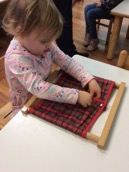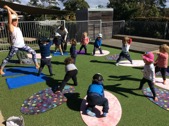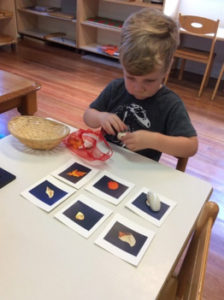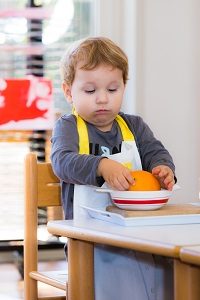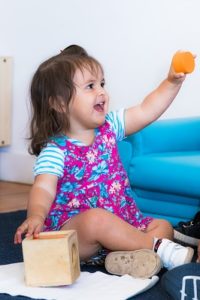 Our program strives to foster independence and physical and language development for the infants. Maria Montessori observed that children learn through movement and exploration of their surroundings. Through movement, infants build an internal map by which they orient themselves, connect with the world, and self-teach.
Our program strives to foster independence and physical and language development for the infants. Maria Montessori observed that children learn through movement and exploration of their surroundings. Through movement, infants build an internal map by which they orient themselves, connect with the world, and self-teach.
The infant community is kept small, intimate and flexible so that the needs of each child can be adhered to at all times. It focuses on the development of language and refinement of voluntary movement and is designed to increase independence and support the development of the brain through sensory experiences.
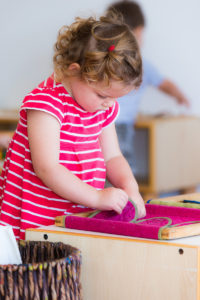 Our under three program provides the environment and activities to support the development in these areas where children form part of a nurturing community and develop:
Our under three program provides the environment and activities to support the development in these areas where children form part of a nurturing community and develop:
- Basic faith in themselves
- Self-confidence
- A sense of independence and autonomy
- Self-esteem
- Social participation
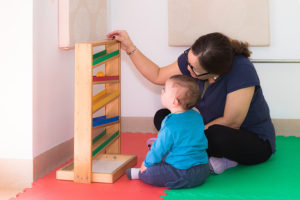 Nido is the Italian word for nest, and is appropriately used to describe the infant environment which is warm, inviting safe, cosy and a loving atmosphere allowing children to explore calmly during this beginning stage of life. Our Nido community is a carefully prepared home-like environment and is especially designed for the changing development needs of infants from 8 weeks of age to walking. The floors are heated and the room has designated areas for awake time, sleeping, eating and physical care (toileting) routines. The room gives babies a sense of order and orientation allowing them to securely explore in the environment.
Nido is the Italian word for nest, and is appropriately used to describe the infant environment which is warm, inviting safe, cosy and a loving atmosphere allowing children to explore calmly during this beginning stage of life. Our Nido community is a carefully prepared home-like environment and is especially designed for the changing development needs of infants from 8 weeks of age to walking. The floors are heated and the room has designated areas for awake time, sleeping, eating and physical care (toileting) routines. The room gives babies a sense of order and orientation allowing them to securely explore in the environment.
Maria Montessori observed that children learn through movement and exploration of their surroundings. Through movement, infants build an internal map by which they orient themselves, connect with the world, and self-teach.
This community offers space for the young child to naturally move from a physical/emotional stage of development to the more cognitive phase of learning. Through movement and exploration, the child is exposed to a broader world where parallel play becomes interactive play, where words become tools to communicate needs and desires, and where the boundaries of possibility expand alongside the developing mind. Our classroom provides activities that seduce the child to care of oneself and the environment, foster further refinement of gross and fine motor skills and provide structure and organization for pre-academic learning.
Parents will be able to plan their child’s individual routines with our educators in the morning to ensure each child’s natural biological rhythm is supported and discuss any changes of routines as their children further develop. Parents and educators must work together VERY closely during this time to ensure the consistency between home and school and be sensitive to any developmental changes.
The Nido classroom at Headland Montessori ELC accommodates 12 children. We have three qualified educators working in the room at all times.
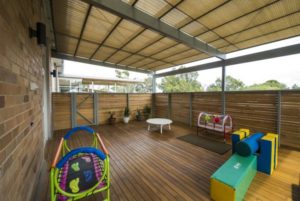
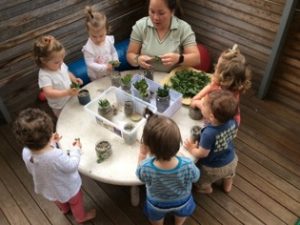
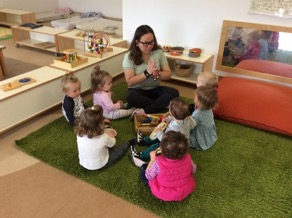
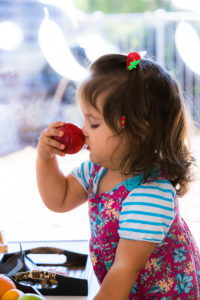
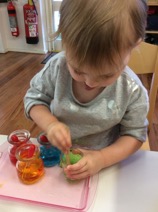
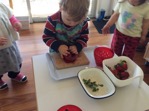
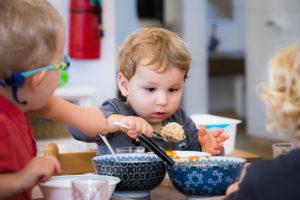
The toddler community offers space for the young child to naturally move from a physical/emotional stage of development to the more cognitive phase of learning. Through movement and exploration, the child is exposed to a broader world where parallel play becomes interactive play and where words become tools to communicate needs and desires. Our classrooms provide activities that engage the child to care of oneself and the environment, foster further refinement of gross and fine motor skills and provide structure and organization for pre-academic learning.
Food preparation and practical life activities are at the heart of our program. Preparing the snack for morning tea and baking creates opportunities for the children to learn about hygiene practice, develop their fine motor skills and concentration, learn new vocabulary and absorb mathematical concepts.
One of the major areas of focus is toileting. We will require your child to be dressed in clothes that enable them to undress and dress themselves independently using Velcro instead of buttons or buckles. Children have numerous opportunities for group and individual toileting throughout the day.
At Headland Montessori ELC, our 2 infant communities have 14 children with three educators working in the room.
